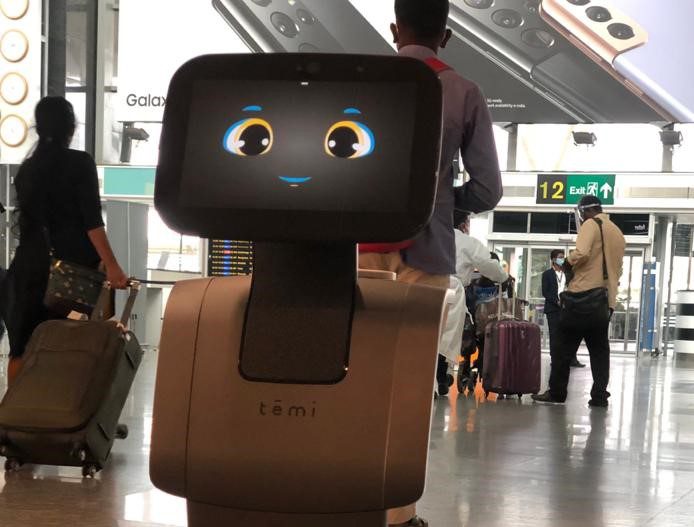
robot at Bengaluru airport 2
Kempegowda International Airport (KIA) in the southern Indian city of Bengaluru has introduced ten AI-driven robots to assist and enhance the passenger experience at the airport. Bengaluru is known as the Silicon Valley of India and becomes the first airport in the country to have robots for assisting passengers. Robot helpers enter India at Bengaluru Airport.
Currently at the trial stage, the robots will assist passengers with services which include providing information on flight status and passenger convenience services. They will also provide directional assistance and retail and food and beverages information.
The robots will navigate autonomously through the terminal and escort passengers to their desired locations. If due for any reason, a robot is unable to answer passenger queries, passengers will be immediately connected to the ‘Airport Help Desk’ via video call from the robot’s screen.
Although new in India, robots have been used at airports terminal across the world for a few years. Last year, the website Airport Technology referred to a survey from that about one-third of all the world’s airports have plans to introduce robots in the next few years. They could assist in security checks, check-in, and baggage handling but also in other tasks like cleaning or food delivery in restaurants. Airports that use robots are Hamad International in Doha (Qatar), London Heathrow, Philadelphia, and Istanbul.
Taxibots used to move aircraft
Kempegowda Airport has been using robot technology to its advantage for some time now. KIA has also used taxibots or taxing robots which can move an aircraft from the terminal gate to the take-off point (taxi-out phase) and return it to the gate after landing (taxi-in phase). This not only saves fuel and conserves the environment but also ensures fewer chances of Foreign Object Damage to the aircraft. KIA is the second airport after the Delhi International Airport in India’s capital to use taxi-bots in India.
Earlier this year, KIA partnered with Amazon Web Services to establish a joint innovation center that will drive the development and adoption of digital solutions in aviation. The airport also allows facial recognition technology-based check-in for some airlines including Vistara and AirAsia both of which are owned by Tata Sons. Tata Sons also took over Air India and Air India Express in January this year.
To avail of the facial recognition service, a passenger has to pre-register and provide her/his name, e-mail id, mobile number, and approved identity papers for registering. The airport was the first green field airport to be established through the public partnership route in India. The airport’s website shows that private promoters hold a 74 percent stake while the government holds the remaining 26 percent in the partnership.
Views: 15




